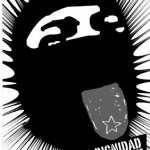What has united the myriad of occupy movements, so far, has been a critique of rampant privatisation and inequality correlated to a demand for a ‘real’ democracy. The latter implies that the current model is a fake and expresses the necessity of building something different.
Over the past decades, our ‘leaders’ have increasingly excluded us ‘the people’, from the decisions that shape our lives, creating the necessity for a movement based upon inclusion. Through the broad based banner ‘We are the 99 percent’, we embrace and embody multiple oppressions; paradoxically making us irrepresentable. The ‘not in my name’ sentiment, which animates many of us, is one of the consequences of a deep rooted crisis of representative politics that has plagued the liberal-democratic world for the past decades.
However, the idea of a social movement that refuses to lead, or ‘speak for’ others, is not new or necessarily distinctive of the western world. As a matter of fact, the most notable frontrunners of this kind of social experiment are the Zapatistas.
Their experience began 1994, when the Zapatista revolutionary army or EZLN declared “war on the Mexican state” and expelled federal troops from the Mexican region of Chiapas. Since then, they have been fighting with the people to defend Chiapas against military, paramilitary and corporate incursions.
Despite being a formally constituted army of the traditional kind, their resistance is mostly non-violent. The key aim of the Zapatistas is to help the people of Chiapas find their own voice and be heard by those who would otherwise remain deaf, which, predictably, includes those who would seek to ‘represent’ them: the official parties of the Mexican political establishment and various Marxist and revolutionary groups.
 As explained by the movement’s most renowned spokesperson, Subcomandante Marcos, “Zapatismo is not an ideology; it is not bought and paid for by a doctrine. It is … an intuition. Something so open and flexible that it really occurs in all places. Zapatismo poses the question: ‘What is it that excluded me?’ ‘What is that has isolated me?’… In each place the response is different”.
As explained by the movement’s most renowned spokesperson, Subcomandante Marcos, “Zapatismo is not an ideology; it is not bought and paid for by a doctrine. It is … an intuition. Something so open and flexible that it really occurs in all places. Zapatismo poses the question: ‘What is it that excluded me?’ ‘What is that has isolated me?’… In each place the response is different”.
One of the most fascinating features of this movement, is their decision-making structure, which they describe as ‘governing-obeying’. The Zapatistas make themselves directly accountable to the ‘Clandestine Revolutionary Indigenous Committees’ (CCRI) which are local and regional assemblies based on the principle of delegated democracy. However these are not ‘permanent structures’, but are continuously subject to the views of the various communities.
This system goes far beyond Marx’s concept of the ‘Paris Commune’. For this ‘revolutionary’ organising system to work the voice of every ‘compañero’ must be heard. Thus, power does not so much move from the bottom up, but rests with the ‘bottom’, remaining permanently subject to the views and wishes of the people themselves.
Clearly the process can appear long and tolling, but it has allowed for the focus to be shifted onto the conversation rather than the immediate results, creating the first truly inclusive revolutionary movement. As Marcos puts it: “In the world of the powerful there is no space for anyone but themselves and their servants. We want a world in which many worlds fit. The nation that we construct is one where all communities and languages fit, where all steps may walk, where all may have laughter, where all may live the dawn’.
The stance and philosophy of the Zapatistas is, remarkable in itself, but also symptomatic of a more general shift in the underpinnings of the political ‘field’, highlighting the problems of ‘representation’.
In our tent communities, we are opening up new means of doing politics on the basis of the idea that “politics” is not only nor principally a profession – the “business” of the so-called political class – but rather that politics is the only way we have to resolve problems collectively.
What links the Occupy movement and in particular St Paul’s to a revolutionary army in the Mexican mountains is the ‘intuition’ of needing something new, an economic and political system that serves ‘the people’. In this sense we do not ‘speak for’ the poor and oppressed around the world, but we are in solidarity with them. This renewed discourse has brought to the fore the things that, despite differences, we share in common with people rising up across the globe. Ours is one the many instances of the struggle between ‘Power’ (or ‘Neoliberalism’) and the millions of people subject to it.




